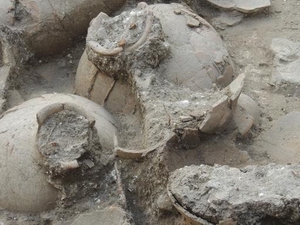 ear-old wine cellar has been unearthed by a team of American and Israeli researchers at a 75-acre Tel Kabri site in Israel.
ear-old wine cellar has been unearthed by a team of American and Israeli researchers at a 75-acre Tel Kabri site in Israel.The excavations, co-directed by Eric Cline of the George Washington University (GW) and Assaf Yasur-Landau of the University of Haifa, with Andrew Koh of Brandeis University as associate director, has found what could be the largest and oldest wine cellar in the Near East.
Initially, the researchers uncovered a three-foot-long jar, later named 'Bessie'. In total, the excavation found 40 jars that have a capacity of about 2,000l - equivalent of nearly 3,000 modern bottles of reds and white wines.
GW Department of Classical and Near Eastern Languages and Civilizations chair Cline said, "This is a hugely significant discovery -- it's a wine cellar that, to our knowledge, is largely unmatched in its age and size."
Brandeis University classical studies assistant professor Koh analyzed the jar fragments using organic residue analysis, and discovered traces of tartaric and syringic acids, both key components in wine.
He also found compounds suggesting the presence of ingredients used in ancient wine-making - honey, mint, cinnamon bark, juniper berries and resins, the recipe which is similar to medicinal wines used for 2,000 years in ancient Egypt.
The findings have been presented in Baltimore at the annual meeting of the American Schools of Oriental Research.
Researchers are planning to continue the analysis of the composition of each solution, in order to discover enough information to recreate the flavor.





